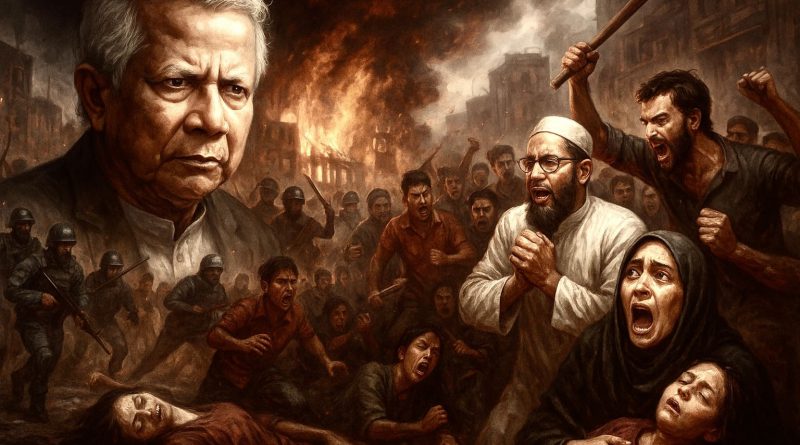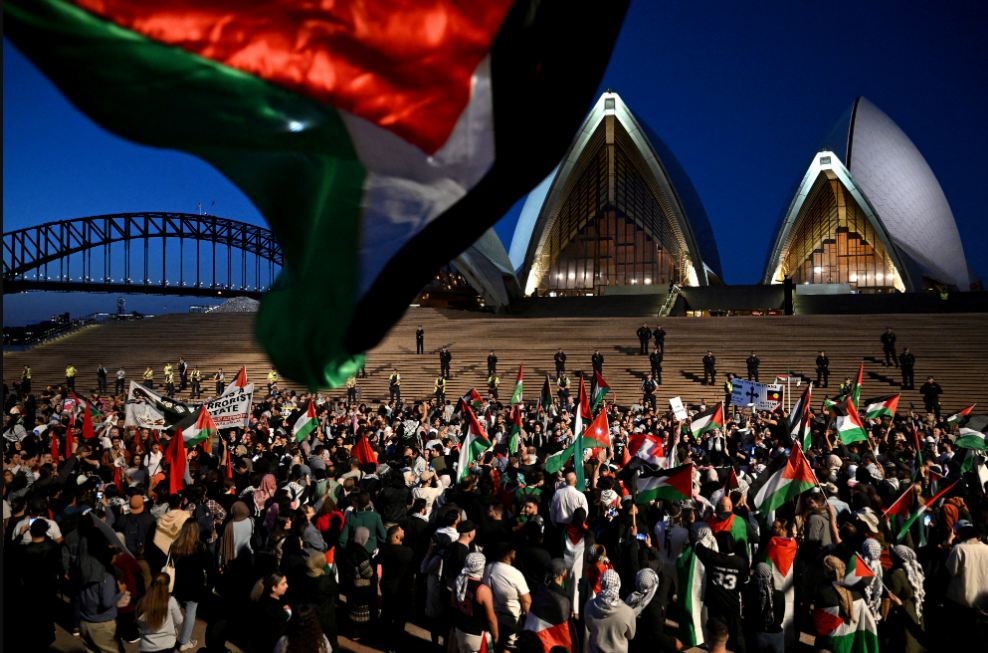OPINION: Mohammad Yunus turns Bangladesh into a Stage of Horror
Co-Author SM Faiyaz Hossain
Under the current interim regime, extrajudicial violence has not merely been tolerated; it has been routinized.
Once lionized as the “banker to the poor,” Mohammad Yunus the microcredit mythologist now presides—directly or symbolically—over a Bangladesh in slow-motion disintegration. Over the past fourteen months, the mounting crises—economic, legal, social and political—no longer speak of mere instability; they shout systemic collapse and kleptocracy. Yunus’s promise of reform now rings hollow amid daily horrors.
The promise reflects his longstanding fictitious tales of donor friendly rhetoric and fundraising manuals pertaining to three zeros; and sending poverty to museums.
Economic Stagnation and Social Collapse
Bangladesh’s long-praised growth trajectory has lost traction. In FY 2024–25, growth fell to 4.1 %, the weakest since the COVID era, per World Bank assessment. If the investment drought deepens, projections suggest a drop toward 3.3 % in 2025.
Over 100 garment factories have shuttered over the past year, costing tens of thousands of jobs (Daily Industry BD). Official unemployment hovers at 4.6 %, but a deeper reckoning of underemployment, youth joblessness, and hidden labor markets suggests far higher human cost (Daily Observer). Nearly 85 % of workers remain informal—no contracts, no social protection (Dhaka Tribune).
In industrial belts like Gazipur, police acknowledge many arrested for petty theft or street mugging are recently laid-off factory workers (New Age). When the state fails to provide, survival becomes the only logic, and crime swells to fill the void.
Theories of Yunus delivered to convince his Western philanthropists have failed to make financial relevance with Global investors. Yunus doesn’t just lack political acumen, he was too naïve to begin his step in the game.
Lawlessness, State Terror, and Mob Carnage
Justice no longer exists as a concept, only as a performative façade masking systemic brutality and institutional collapse. Under the current interim regime, extrajudicial violence has not merely been tolerated; it has been routinized. In the first quarter of 2025 alone, at least 8 extrajudicial killings and 19 deaths in custody were documented.
Between August 2024 and March 2025, human rights monitors recorded 20 such killings, involving torture, beatings, and summary executions. Mob lynchings have surged with terrifying ferocity: between mid-2024 and mid-2025, at least 637 people were lynched—representing a twelvefold increase from the 51 deaths recorded in 2023.
This wave of vigilante violence has been met with state indifference—if not tacit encouragement. Simultaneously, religious minorities have been subjected to a coordinated campaign of persecution: between August 2024 and June 2025, 2,442 hate crimes—including arson, sexual assaults, desecration of temples and churches, and targeted killings—were recorded, underscoring a culture of impunity that has metastasized into open terror.
These are not isolated incidents but symptoms of a regime where law is weaponized, justice is ornamental, and human life is expendable.
Since Muhammad Yunus assumed office, there has been a disturbing rise in alleged political persecution through the legal system: arrests, false lawsuits, and invented murder charges serving as tools of harassment rather than justice. Beyond the courts, thousands have been detained under Operation Devil Hunt, with over 11,300 arrests reported by late February 2025, many allegedly including people with only tenuous or no links to criminal acts.
Yunus never had, never tried for public mandate. Employed by the protesters of July uprising is far from being a democratic mandate. Yunus never had the courage to face a public referendum to justify his throne. He preferred to enjoy the authority, ban political parties without referendum and promote divisive rhetoric among the masses.
Women, Children, and the Machinery of Cruelty
The sexual violence statistics are a national disgrace. In the first half of 2025, 481 rape cases were reported—nearing the total for all of 2024 (The Daily Star). Child rape cases, in just one seven-month span, rose by 75 % (The Daily Star).
Protests led by women or students are met with torture, rape threats, solitary confinement (Human Rights Watch). Ibtedayi teachers demanding job recognition were beaten, tear-gassed, and dispersed in January 2025 (JMBF).
Prisons continue to serve as killing grounds. Deaths in custody are frequent; euphemisms like “heart attacks” or “natural causes” mask systematic violence.
Corpses in Rivers: the Floating Dead
A macabre trend haunts Bangladesh’s waterways. River police data show that in 2025, an average of 43 bodies each month have been pulled from rivers, up from 36 per month in 2024. From January to July 2025 alone, 301 bodies were recovered; 92 remain unidentified. Narayanganj recorded 34 recoveries, Dhaka 32 (Daily Star).
In one case, a woman and a child were found floating in the Buriganga River, both strangled before being dumped, according to autopsy (Financial Post BD). In late August, a headless body was recovered from the Shitalakkhya River in Narayanganj; the victim was later identified as a 27-year-old man (Financial Post BD).
In Keraniganj, the bodies of a man and woman were discovered tied with a 50-kg rice sack, and another victim in a burqa drifted nearby (Financial Post BD).
In Netrokona District (March 2025), the bodies of three fish poachers were found in the Dhanu River after clashes involving community groups (bdnews24). In Chandpur, two older men were retrieved from the Dakatia River—one with visible stab wounds and a severed leg vein (Dhaka Tribune)¹⁷.
In Khulna, over 50 bodies were pulled from various rivers between August 2024 and September 2025; 20 remain unidentified (Khulna naval police). In Chandpur’s Meghna River, seven bodies from an Al Bakhira cargo vessel murder were handed over to families—and a probe committee was formed (BD Pratidin).
Notably, the body of journalist Bibhuranjan Sarkar—after threats and intimidation—was recovered from the Meghna River in Munshiganj in August 2025 (IFJ / BMSF).
These are not accidents or drownings; they are executions turned invisible, pollution turned weapon, rivers made into graveyards without funeral.
Passport, Visas, and Global Shame
Bangladesh’s passport value has eroded, visa rejections are multiplying, and global watchdogs—HRW, Odhikar, UN human rights bodies—have flagged Dhaka for systemic violations.
The moral capital of the country is bankrupt. Investors and donors hesitate to engage with a government intertwined with terror, silence, and complicity.
Disasters as Symptoms, Not Anomalies
The October 13, 2025 garment-chemical factory fire in Dhaka, which killed 16 workers, was not a random accident — it was a preventable massacre. Locked rooftop escape doors and unchecked toxic gas turned the building into a sealed crematorium.
Days later, the Yunus government has failed to launch any credible investigation, identify the factory owners, or bring those responsible to justice.
No arrests have been made, no compensation schemes publicly disclosed, and no structural safety audits initiated. Instead, the administration has issued vague statements and deflected responsibility, shielding business interests at the expense of workers’ lives. This silence is not mere negligence — it is complicity.
This is not a standalone incident, rather a pattern. The handling of the Gazi Tire Factory fire tragedy reflects a troubling pattern of negligence and institutional disregard for accountability.
Despite the devastating loss of life and clear safety failures, Yunus—under whose interim government the incident unfolded—failed to ensure a thorough, transparent investigation or meaningful compensation for victims’ families.
This inaction not only denied justice to the workers but also signaled an alarming indifference to labor rights and workplace safety. In the past 13 months, similar negligence has been observed in incidents such as the Hazaribagh factory fire (2024) and the Chittagong shipbreaking yard accidents (2024-2025), where victims were met with inadequate investigations and stalled compensation efforts.
By neglecting to pursue corporate responsibility and systemic reform, Yunus reinforced the vulnerability of industrial workers in Bangladesh, deepening mistrust between the state and its most exploited laborers. His failure to act decisively in the aftermath stands as a stark contradiction to his international image as a champion of social justice.
Over the past 13 months of the Yunus regime, Bangladesh’s labour sector has been trapped in a cycle of grand promises, fragile protections, and cynical neglect. The government’s repeated declarations of “historic reforms” amounted to little more than political theatre, as factory floors across the country continued to mirror a grim reality of wage theft, unsafe workplaces, and repressed voices.
While MoLE boasted of upcoming amendments to labour laws, millions of workers — especially in the sprawling informal sector — remained invisible to the legal system. Inspection bodies were underfunded and toothless, allowing factory owners to operate with impunity as thousands were laid off illegally, denied benefits, and silenced when they protested.
Unionization was stifled, particularly in Export Processing Zones, where rights existed only on paper, and “social audits” became nothing more than PR rituals for global brands. Worker unrest exploded repeatedly, from delayed Eid allowances to unpaid salaries and unsafe conditions, yet the government responded with empty press briefings and tokenistic committees.
The much-touted October 2025 labour law reform deadline became a symbol of inertia, tangled in corporate resistance and bureaucratic gamesmanship. The past year has laid bare a bitter truth: under Yunus’s leadership, labour rights were not defended — they were traded off, delayed, and dismissed, leaving workers to fight alone against a system designed to exploit them.
From Savior Icon to Enabler of Decay
Mohammad Yunus once embodied a hopeful alternative—microcredit, grassroots empowerment, moral leadership. Yet under his interim leadership, Bangladesh is unravelling in every direction: economic collapse, mob justice, sexual violence, extrajudicial killings, rivers flooded with corpses, and institutional impotence. From Teachers to slums, the elites to poets all have suffered under the Yunus’ reign of Terror.
Yunus may not have physically ordered every atrocity, but he now presides over a regime that normalized them. His Nobel halo cannot conceal the inferno beneath. Rebuilding a nation demands more than symbolic leadership—it demands justice, accountability, and courage. Today, Bangladesh has none. Yunus had the opportunity to unite the nation and develop a social contract among the political parties. Instead what Yunus has contributed had cemented a pipeline for cycle of violence to multiply in the future.
Disclaimer: Views expressed by writers in this section are their own and do not reflect Milli Chronicle’s point-of-view.



